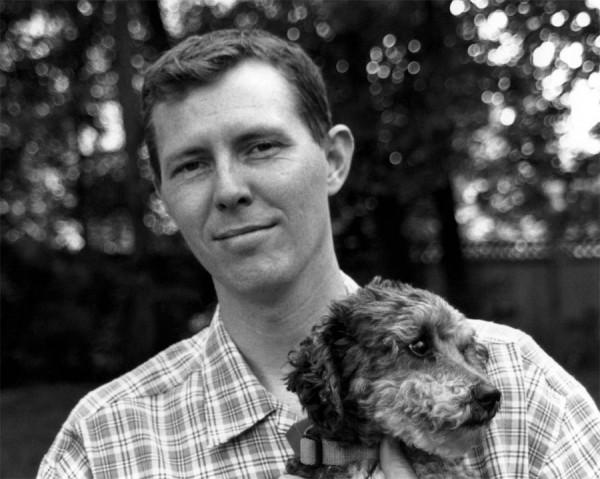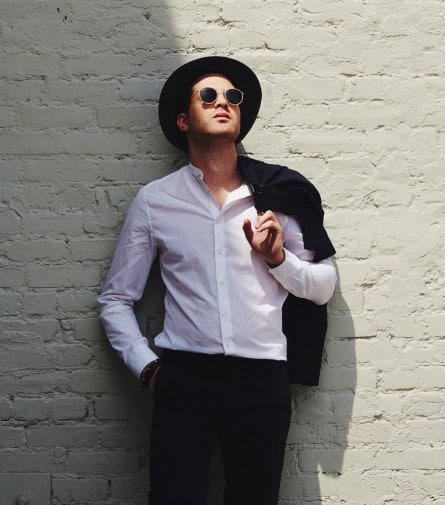Videos by American Songwriter
After releasing an out-of-left-field album of Michael Jackson covers, Chicago singer-songwriter Robbie Fulks is back with a new album of original material, recorded over a mere three and a half days, dubbed Gone Away Backward. We asked Fulks about his approach to writing, staying inspired, the backlash from Jackson fans and more.
Tell us a bit about your new album.
It’s a small-group mostly acoustic record, duos up to quintets. Five of us rotate among mandolin, dobro, acoustic and electric guitar, fiddle, bass, and banjo. The mood is kind of pensive-to-bleak. The songs deal with people on the social margins, unrequited and lost love, memory, rambling, and so on. It’s country music.
How would you compare it to your last album?
More thematically and musically focused. The glue on my last one was that all the songs had been recorded at some point by Michael Jackson, and I recorded it over the course of about 9 years. Here, I wrote most of the songs, wrote most of them with this group and recording in mind, and we recorded them in 3-1/2 days. We sang and played without overdubs and almost without playback too. Altogether, compared to the MJ thing, it’s more of a snapshot, and I would say it has more consistency and cohesion.
Did you have any interesting interactions with hardcore Michael Jackson fans after releasing Happy?
Not really, but Greg Kot wrote about it for the Chicago Tribune, and I noticed that there was plenty of angry response from Michael’s fans about my good-humoredly exaggerated dismissal of Invincible (“worst atrocity ever” I might have said). I guess if you’re a true MJ acolyte it’s all or nothing. Like a guy on Long Island I knew in 1980 who was a diehard Bob Dylan nut. The Christian records were coming out and I asked him if that, or indeed anything Bob could ever record, would cause him to waver in his fanhood. He said, “I don’t care if he puts out a record of himself pissin’ and fartin’ — I’m in!” Personally, I don’t go that far in my embrace of any musician.
Who are your songwriting heroes?
From boyhood: Bob Dylan, Lennon/McCartney. From young adulthood in the 1980s, when I was more of a scenester, and from the list you can tell what scene: Nick Lowe, John Hiatt, Elvis Costello, Terry Adams, Marshall Crenshaw, Graham Parker, Billy Bremner. From when I got into C&W a couple years later: Felice and Boudleaux Bryant, Harlan Howard, Rex Griffin, Leon Payne, Sonny Throckmorton, Dennis Linde, Bob McDill, just on and on and on. At this point the list would include lots of R&B and gospel and standard American songbook writers. I like all styles, and have added consistently over the years while subtracting hardly anything.
When did you start writing songs? Were they good right away, or did that come later?
Yes, they were fucking awesome. Awesomely terrible! And they’re still not good, on average. The fraction that end up on records are the keepers, in theory. I started trying to make up songs when I was about 10. I also made up music groups with long recorded catalogs, television networks with all-day programming starring myself, novels, poetry, and friends. You don’t want to listen to those songs any more than you want to play with the invisible friends. The oldest one that I still sometimes do I wrote when I was 22. I didn’t hit stride until I worked as a professional songwriter in my early 30s — and (like everybody) I think my best is right now. Songwritingwise it’s been what Donald Rumsfeld would call a long hard slog. Writing a good song turns out to be as hard as bringing democracy to foreign lands. How there have come to be so many good songs in the world I can’t understand.
What was the first song you ever wrote? Tell us about it.
The first I wrote that I ended up doing regularly in my shows was when I was 15 and it was called “The Little Boy on the C.B. Radio,” an allegedly comic parody of a Red Sovine kind of tune. A boy calls a trucker and says a lot of sweet and pathetic things about his life, and then dies mid-sentence. An audience favorite.
What’s the last song you wrote or started?
I’m working on 4 or 5 at the moment. This morning I worked on one that’s about a guy in Massachussetts whose daughter moves in with a redneck in Johnson City, TN. The narrator is just incensed, and he rants at east Tennessee culture — “for this we beat you in the war?” and that kind of thing. There’s some ambiguity, and an indication that the narrator’s POV isn’t trustworthy, in the fact that he’s singing anti-country sentiments over an extremely country groove, with banjo.
How do you go about writing songs?
I get privacy, sometimes at the rather exorbitant cost of getting a hotel room a mile or two from my house. There I spend 6 to 12 hours a day in isolation, no Internet or cell phone, just a notebook, pen, guitar, and maybe a dictionary and thesaurus just in case. I find it next to impossible to make something happen when I can hear the kids or the phone or when I think I can be heard fumbling around, warbling dumb words and endlessly repeating and varying snatches of melody.
What sort of things inspire you to write?
First, when I’m assigned to write something, with money attached and a strict deadline — that’s really best. I find I can really deliver when I’m more or less compelled to. Beyond that, I need the dogged schedule to make songs come out, and I also need the occasional flash that comes from who-knows-where. Now and then a line or two with an enticing melody just shoots into the old lobe, while I’m driving or showering or walking the dog. Now that I look at that list of activities, it seems the blood needs to be flowing. Hemingway’s method of never sitting while working probably has wide applicability.
What’s a song on Gone Away Backward you’re particularly proud of and why?
Well, in behalf of “Long I Ride,” I will say that I like its fairly minimal melody and form. I believe it sustains interest for a good while despite being primitive on the surface. It’s pentatonic — five notes — though across more than one octave. The story moves a little elliptically from place to place, state to state, girl to girl, temperature to temperature. The narrator is a little jerky.
What’s a lyric or verse from the album you’re a fan of?
Well, from that song, there’s: “They say that there’s a wond’rous land, for any good man that dies/And if it’s got drink and women, well, then I’ll be surprised.” There’s plenty of eggheads ripping away at the absurdities of eschatological specifics; it makes me happy to do it in a common-sense country-guy way.
The most annoying thing about songwriting is….
The writing of the song.
What’s a song of yours that’s really touched people?
Wow, these questions are really designed to make you sound like a wacko. This probably isn’t what you mean by “touched,” but my song “Fuck This Town” was something I heard from people about. It’s a comic venting song about 1990s-era Music Row ridiculousness, which I was immersed in at that time, and it’s in the tradition of “Take This Job and Shove It” and “This Is The Last Song I’m Ever Gonna Sing” and all that. It made me happy to hear from other frustrated songwriters about it, but most of the people it touched seemed to be angry amped-up half-starved hillbillies who thought they deserved to be on the payroll at Capitol Records.
Do you ever do any other kinds of writing?
I’ve tried to write essays and stories. Songwriting has more angles and I find it much tougher to crack.
If you could co-write with anyone living or dead, who would it be?
Co-writing hasn’t proved a very successful method for me, because I work v-e-r-y slowly and am also not much of a people person. But there’s a hundred people I would love to meet and try learning from, especially if we’re bringing back the dead. Annette Peacock, Paul McCartney, Frank Loesser, Bill Callahan, Carole King, Otis Blackwell, Uncle Dave Macon, Willard Robison, Cindy Walker, Hank Thompson, Stephen Sondheim….
Who do you consider an underrated songwriter?
In the country field there are these workmen like Mark D. Sanders and Billy Yates who have near zero name recognition outside their circle of peers and professionals but who are the fundamental drivers of a massive industry, decade after decade, and whose work resonates with millions of listeners.
What do you consider to be the perfect song (written by somebody else), and why?
Ask me tomorrow and the answer will be different, but for today, since my friend Jack Clement died recently, let’s say “Miller’s Cave.” It has five verses. Every line moves an interesting story along to a perfect Greek-tragedy ending, and each verse’s penultimate line-end rhymes with “cave” — not the easiest word to rhyme in a casual and meaningful way. It has love, betrayal, fatal violence, and humor. All the attributes that make country music so fucking incredible and unique.














Leave a Reply
Only members can comment. Become a member. Already a member? Log in.